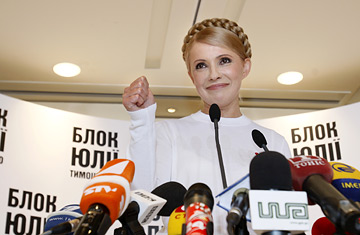
Yuliya Tymoshenko, Ukraine's opposition leader, speaks to the press after a strong showing in parliamentary elections in Kiev.
The campaign for Ukraine's parliamentary elections was fairly humdrum given the stakes at play after more than a year of governmental gridlock. But there was ample excitement the morning after Sunday's vote over the key question: who finished first?
The BYUT party of Yuliya Tymoshenko, the former Premier fired in September 2005 by her Orange bloc rival, Victor Yushchenko, appears locked in a neck-to-neck race with the Party of Regions (PR), led by incumbent Premier Victor Yanukovych. With 68 percent of the vote counted, Tymoshenko, whose party advocates closer relations with the West, had 32.59 percent, versus 31.62 percent for Yanukovych, considered closer to Russia. Despite the difference at the moment being a mere 0.97 percent, an already triumphant Tymoshenko promised the media this morning that she would face them next time as Premier. However, as more votes come in from eastern Ukraine, the PR's stronghold, Yanukovych may still come up the winner, says respected Kiev-based political analyst, Victor Nebozhenko. If he pulls it off, however, it will be by a much narrower margin than expected, Nebozhenko says, and given the PR's campaign investment of some $400 million, "it's a rout."
Nebozhenko believes no less a rout awaits President Yushchenko, the hero of the Orange Revolution almost three years ago. The pro-presidential alliance of Our Ukraine and People's Defense, (OUPD) is trailing in third with some 15% of the vote. And as the results come out, the real intrigue — who will build a majority coalition and on what terms — will emerge from the back rooms into the limelight. If she squeaks by Yanukovych, Tymoshenko appears to be in a stronger position than ever to dictate terms to Yushchenko.
The Orange forces, however triumphant, know that the unity they've worked so hard to restore is still fragile. Yushchenko had promised Tymoshenko the premiership on the expectation that she would win some 22% of the vote, and hoped to preserve most key Cabinet jobs for his own OUPD. But Tymoshenko's apparent success allows her to insist on appointing all the ministers herself. Yushchenko is known to be unwilling to accept that: he wants to have his own Foreign, Defense and Interior ministers.
The formal process of forming a government begins with constructing a majority coalition. Then the coalition asks the President to nominate the Premier, who in turn forms the Cabinet. Said Tymoshenko to TIME: "Now we have not only to contemplate the Cabinet's first steps, but also watch very carefully how the coalition will be shaping up." This time, comments Nebozhenko, the process will be turned inside out: the President and his Premier may have to make a deal on the cabinet first before building a coalition. Fighting over the Cabinet jobs is where the Oranges are very likely to fall apart, Nebozhenko believes. He predicts that talks between the two factions of former Orange revolutionaries, led by Tymoshenko and Yushchenko, will prove so difficult that Yushchenko will join hands in a coalition with his formal archrival, Yanukovych, sometime before the New Year Eve.
Part of that inner-Orange rift could stem from Tymoshenko's previous agreement to cede the Speakership of the Verkhovna Rada, Ukraine's unicameral parliament, to Yushchenko's forces. Now, however, with former Speaker Volodymir Lytvyn's bloc having made it back into parliament, Tymoshenko might co-opt his tiny faction as a makeweight, and give him the speakership as a "balancing" force. However, with their dramatic neck-to-neck racing, Yanukovych still retains a chance to get ahead of Tymoshenko and finish first. In this case, though, "makeweights" of the Lytvyn block and the Communist party who is also making it to the Rada will still be insufficient to outbalance the joint Orange forces. Then, Yanukovych will likely be waiting until his Orange rivals break up fighting over the Cabinet positions — and seek a coalition with Yushchenko, who had prudently left this option open as well.
Since they lost the presidency to Yushchenko in December 2004, Yanukovych and PR have often threatened get it back through an early presidential election. But now the specter of such an election arises instead from an unexpected corner: that of the ever-ambitious Tymoshenko feeling that she would surely carry it in the runoff. Fighting for the presidency — and restoring the functions it was forced to cede to the Rada in 2005 — might prove more alluring to her than holding a premiership stripped of control over key positions and issues.
Complete preliminary returns for Sunday's vote will likely come in only later tonight, with final official results promised by the end of this week. But in the meantime, Ukraine's political life is clearly in full swing as a normal democratic process. There will be plenty of horse-trading ahead, but most of it will be open and public.
